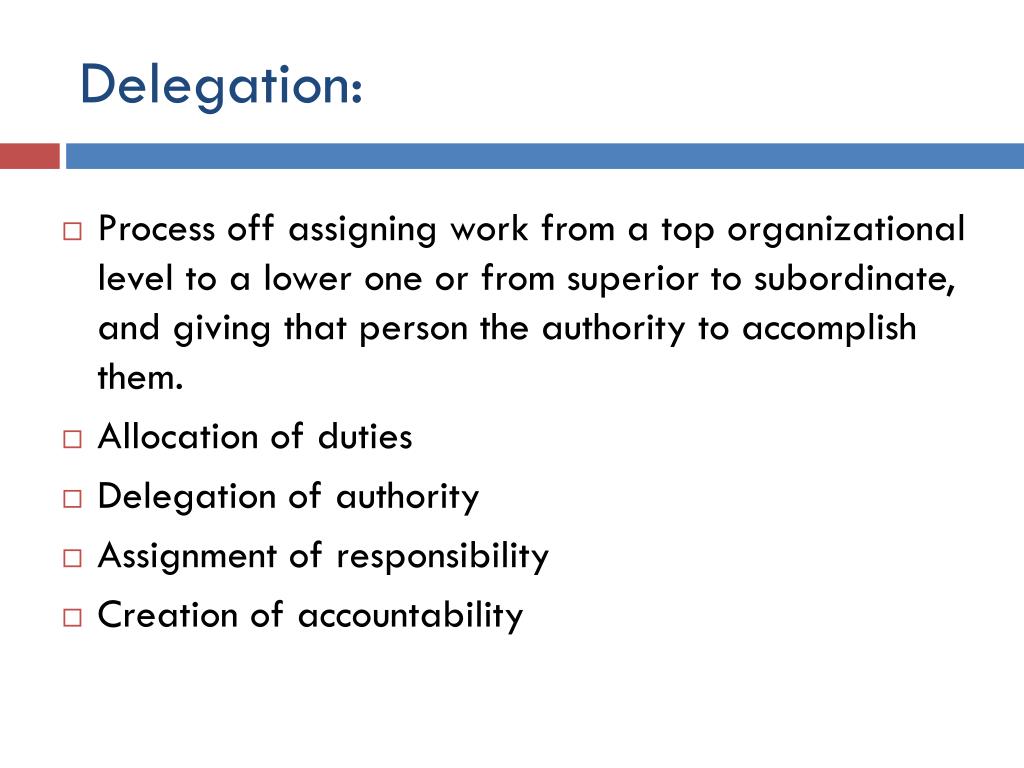

The top executive delegates these responsibilities to the experts, viz., secretary, accountant, and legal adviser. He may have time and energy but he may not have the skill.Ī business has different kinds of jobs, some of which may require specialist persons for their accomplishment. It is also not practicable for a chief executive to give specialist’s advice on every matter. In a big concern, due to its complexities, delegation is a must.Īpart from physical limitation the need for delegation arises in a big complex organisation for securing expert’s services. It is the key to organisation and a cementing force for binding the formal organisation together. Necessity of Delegation of Authority:ĭelegation of authority is the most essential requirement for successful management. It is general when these are not specified, though objectives may be specified. It is specified when the courses of action for particular objectives are specified. Delegation of authority may be specific or general. The extent of authority to be delegated depends upon several factors, like the ability and willingness of the executive to delegate, the ability of the subordinates to accept delegation, the confidence of the superior in his subordinates, the philosophy of management, etc.ħ. Therefore, the authority is recovered fully from the individual when he moves from the particular position.Ħ. The individual occupying a position may exercise the authority so long as he holds the position. Delegation of authority is always made to the position created through the process of organising.
#Delegation process 3 elements full#
Moreover, he does not delegate his full authority to his subordinates, because if he delegates all his authority, he passes his position to the subordinates.ĥ. He cannot delegate which he himself does not possess. A manager delegates authority out of the authority vested in him. may require change in the degree of delegation of authority.Ĥ. For example, change in the organisation structure, policy, procedure, methods etc. Authority once delegated can be enhanced, reduced or withdrawn depending on the situation or requirement.

Delegation does not mean a manager loses control and power. You share with others who then possess the knowledge, but you still retain the knowledge too.” Delegation does not imply reduction in the authority of a manager.ģ. George Terry comments on this concept: “It is something like imparting knowledge.

As a result of delegation, a subordinate employee receives authority from his superior, but, at the same time, his superior still retains all his original authority.
Since the formal authority originates at the top level, it is distributed throughout the organisation through delegation and re-delegation.Ģ. The degree of delegation prescribes the limits within which a manager has to decide the things. Delegation is authorization to a manager to act in a certain manner. Features of Delegation of Authority:ĭelegation of authority has the following features or characteristics:ġ. Besides, it influences the relationship between the subordinate and his superior and the performance of the subordinate.
#Delegation process 3 elements free#
Delegation enables the managers to distribute their load of work to others-thus leaving them free to concentrate on the other important functions of management. Thus, delegation is the means by which a manager can share his duties with his immediate subordinates who, in turn, delegate to their subordinates, and the process is continued until managerial work reaches the supervisors at the lowest level of management and operating work is assumed by the workers.īy means of delegation, the manager extends his area of operation. This accountability can never be delegated by a manager to his subordinates. In delegating authority, the chief executive retains some reserved authority for his own performance as well as the power of demanding accountability from the subordinates for ensuring satisfactory performance on their part. The chief executive delegates a part of his authority to different subordinates for enabling them to discharge the work responsibilities or duties in all areas of the business.


 0 kommentar(er)
0 kommentar(er)
